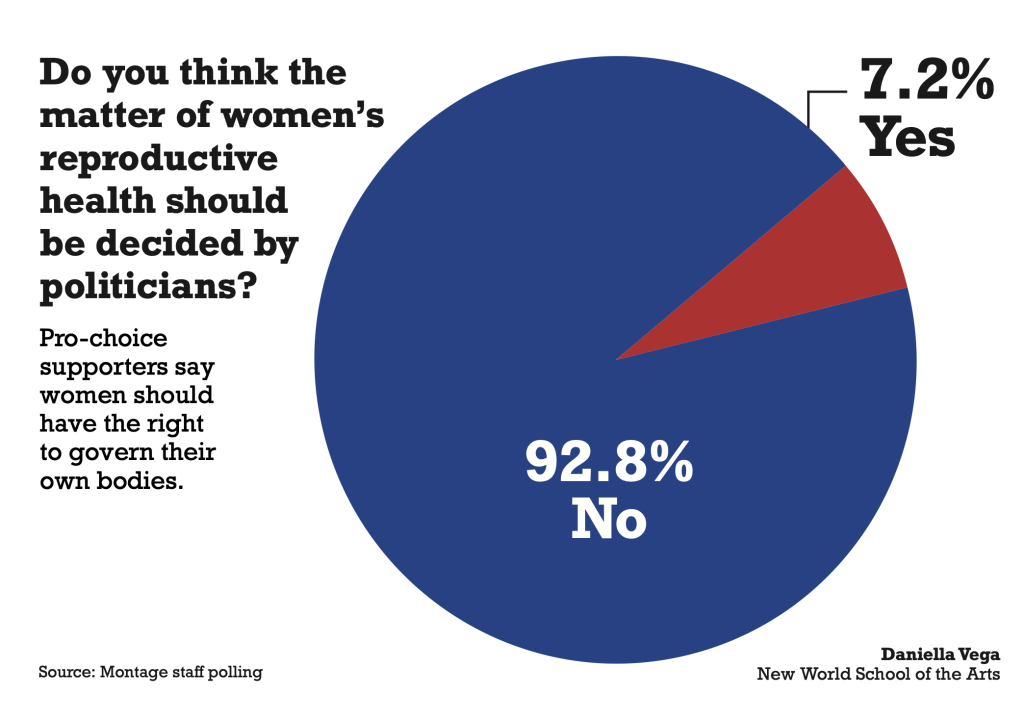Amendment 4: The case for abortion rights
By Dakota Montalvo
South Dade Senior High School/Montage
It’s been two years since the U.S. Supreme Court overturned Roe v. Wade, upending 50 years of federally protected abortion rights.
In Florida, abortion is banned after six weeks, the halfway point of the first trimester. The six-week abortion ban went into effect in May. Exceptions are made in cases of fatal fetal diagnosis to save the life of the mother or for victims of rape, incest or human trafficking.
Now Florida voters will choose whether to make abortion legal up until 24 weeks of pregnancy (or fetal viability) through Amendment 4 on the November ballot.

Floridians Protecting Freedom, a statewide campaign funding the effort to pass the amendment, was created after the reversal of Roe v. Wade with the sole purpose to limit government interference with abortion rights.
“We want to end the extreme abortion bans in Florida,” said Nora Viñas, the group’s communications director. “Currently a woman only has six weeks to make a decision to have an abortion, when in fact, most women don’t even know they’re pregnant.”
A 2024 poll conducted by Ipsos, a multinational market research and consulting firm, shows that 57% of Floridians are in favor of making abortion legal up until fetal viability—the ability of a human fetus to survive outside the uterus.
Pro-choice supporters assert that every woman should have the right to govern their own bodies, be able to make a decision based on their healthcare needs and shouldn’t have to travel across state lines to access reproductive healthcare.
“These women are being turned away because they’re not able to receive the care that they deserve in their own home state but instead have to travel hundreds, if not thousands of miles to other states to receive this care,” said Michelle Quesada, vice president of communications for Planned Parenthood of South, East and North Florida.
Amendment opponents say life starts at conception; the child has a right to life and having an abortion can be detrimental to a woman’s long-term reproductive health.
Tewannah Aman, executive director of Broward Right to Life, said she became pregnant at age 18 and had an abortion. The choice influenced her to become involved in the pro-life, she said.
“I was too young, too immature, and I actually was very scared. Abortion left me feeling empty, detached, and full of regret,” Aman said. “I didn’t understand, and I really initially didn’t even want the abortion.”
Teens, like the rest of the population, differ in their opinions on abortion and the amendment.
Amanda Johnson, 17, stands on the side of pro-life.
“I think life is the most fundamental human right and it is destroying a unique gift,” Johnson said about abortions. “It is important to defend the defenseless,” said Johnson, a senior at Coral Reef High School in Miami.
“It’s important to defend the defenseless.”
Amanda Johnson, senior at Coral Reef High School
Naomi Gee, 17, a senior at Coral Gables High School, said teenagers need options.
“If I got pregnant right now, it would impact college, my young adulthood, and the potential of not being financially ready to provide a nice childhood for a kid,” Gee said. “So, if the government got in the way of my opinion, it would impact not only my life negatively but the child’s life.”
The fate of Amendment 4 will be decided on Nov. 5, when Floridians cast their ballots. For the amendment to pass, 60% of voters needs to choose ‘yes.’ But regardless of the outcome, both sides say they won’t stop fighting.
“We are now doing everything in our power to fight against the extreme abortion ban in the state of Florida,” Viñas said.
Countered Aman: “We’re not going away. We’ll never go away. We believe in life.”